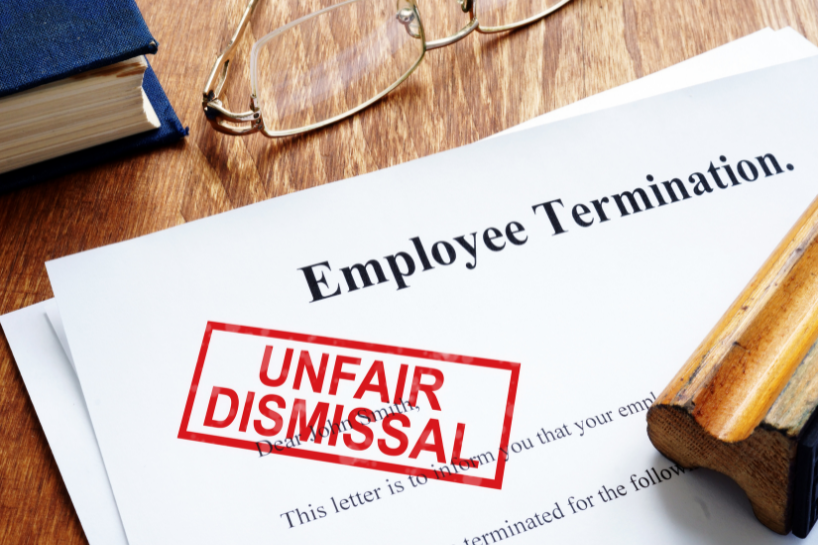The Fair Work Act 2009 (Cth) (“FWA“) is one of the primary pieces of legislation in Australia that governs various aspects of employment, including the rights and protections of employees. A prominent aspect of this act pertains to unfair dismissals, and it provides a framework for employees who believe they have been unfairly terminated. However, it is essential to understand the time limits associated with filing an unfair dismissal claim under the Fair Work Act to ensure that your rights are protected.
Unfair Dismissal Legislative Framework
Part 3-2 of the FWA sets out the framework for Unfair Dismissal claims for eligible protected persons as well as what remedies may be available. Where a protected person believes they have been unfairly dismissed, they may apply to the Fair Work Commission (“FWC”) for relief.
Who is a protected person under FWA?
A person is protected from unfair dismissal under the FWA where:
- The person has been employed by their employer for at least the minimum employment period (this being 6 months where the employer is not a small business and one year where the employer is a small business).
- Where one or more of the following apply:
- They are covered by a modern award.
- They are covered by an enterprise agreement.
- Their income does not exceed the high-income threshold (which as of 1 July 2023 is $167,500.00).
What is an unfair dismissal?
In order to find that an employee has been unfairly dismissed, the FWC must be satisfied that:
- The person has been dismissed; and
- The dismissal was harsh, unjust or unreasonable; and
- The dismissal was not consistent with the Small Business Fair Dismissal Code; and
- The dismissal was not a case of genuine redundancy.
Dismissal is taken to have occurred where;
- the person’s employment with his or her employer has been terminated on the employer’s initiative; or
- The person has resigned from his or her employment but was forced to do so because of conduct engaged in by his or her employer.
The factors that the FWC will consider when determining if a dismissal was hash, unjust, or unreasonable include:
- whether there was a valid reason for the dismissal related to the person’s capacity or conduct; and
- whether the person was notified of that reason; and
- whether the person was given an opportunity to respond to any reason related to the capacity or conduct of the person; and
- any unreasonable refusal by the employer to allow the person to have a support person present to assist at any discussions relating to dismissal; and
- where the dismissal relates to unsatisfactory performance by the person- whether the person had been warned about their performance before the dismissal; and
- the degree to which the size of the employer’s enterprise would be likely to impact on the procedures followed n effecting the dismissal; and
- the degree to which the absence of dedicated human resource management specialist/expertise in the enterprise would be likely to impact on the procedures followed in effecting the dismissal; and
- any other matters the FWC considers relevant.
Time limit under FWA
One of the most critical aspects of making an unfair dismissal claim is adhering to the strict time limits specified in the FWA. An employee has 21 calendar days from the date of their dismissal to lodge their claim with the FWC. This time limit is non-negotiable and generally cannot be extended unless there are exceptional circumstances involved.
What factors are considered by FWC in determining ‘exceptional circumstances’?
Exceptional circumstances are generally considered to be out of the ordinary course, unusual, special, or uncommon. The FWC will consider the following when determining if there are ‘exceptional circumstances’:
- the reason for the delay; and
- whether the person first became aware of the dismissal after it had taken effect; and
- any action taken by the person to dispute the dismissal; and
- prejudice to the employer; and
- the merits of the application; and
- fairness as between the person and other persons in a similar position
Case studies
While the 21-day time limit is generally strict, there are situations where exceptional circumstances may warrant an extension. These circumstances could include severe illness, incapacitation, or other extraordinary events that prevented the employee from filing within the specified timeframe. Ignorance of the timeframe itself is not sufficient to justify an extension of time. To request an extension, employees must provide compelling evidence to support their claim.
Exceptional Circumstances Found- Application for extension GRANTED
Representative Error
The initial representative of the employee failed to notice a reminder to submit the general protections claim application. The employee had provided explicit instructions to their representative for filing the claim. It was determined that the employee had the right to trust their representative, and the delay could not be attributed to any fault on the employee’s part.
Length of time outside timeframe: 3 days
Robinson v Interstate Transport Pty Ltd (2011) 211 IR 347.
*General Protections claims provision has identical wording to the extension of time provisions relating to unfair dismissal claims.
Illness
The employee gave evidence that his depression and anxiety were worsened by the stress at his workplace. He was terminated during a period of personal leave for which the employee had medical certificates. The employer declined to acknowledge these medical certificates and asserted that the employee had abandoned his job. An extension of the timeframe was granted.
Length of time outside timeframe: 3 days
Ovenden v Fortezza Pty Ltd T/A High Country Automotive Group [2010] FWA 3836.
Technical Issues
The employee made two unsuccessful attempts to submit their application on the Fair Work website within the specified timeframe. Consequently, the employee mailed the application to Fair Work Australia. It was determined that the applicant had genuinely tried to file the application within the prescribed timetable, and it was fair and reasonable to use discretion to extend the deadline. As a result, the time extension was granted.
Length of time outside timeframe: 4 days
Johnson Joy Manufacturing Co Pty Ltd t/as Joy Mining Machinery [2010] FWA 1394.
No Exceptional Circumstances-
Application for extension NOT GRANTED
Representative Error
The employee asserted her belief that her representative would initiate the process of filing an unfair dismissal claim on her behalf. However, there was little evidence to support that the employee had explicitly instructed her representative to proceed with the application on her behalf. As a result, the request for an extension of time was denied.
Length of time outside timeframe: 1 day
McLennan v Northern Territory Stolen Generations Aboriginal Corporation [2012] FWA 3167.
Illness
The employee gave evidence that she was sick during the prescribed timeframe to lodge an application. There was evidence demonstrating that the employee had followed up grievances with other agencies within the prescribed timeframe and that the employee was hospitalised after the prescribed timeframe had passed. It was found that ill health may have prevented the employee from making an application for 2 weeks out of the 5 weeks that the application was late. The extension request was refused.
Length of time outside timeframe: 5 weeks
Muir McMeeken v Action Industrial Catering Pty Ltd [2012] FWAFB 5933.
Christmas Period
An employee made his application for unfair dismissal after the prescribed period to lodge an application for unfair dismissal. Christmas occurred during the prescribed period. The FWC found that this was not exceptional as the Christmas period was not an unforeseen event. The extension of time was refused.
Length of time outside timeframe: 8 days
Smith v KJM Contractors Pty Ltd (2010) 201 IR 356
The FWA provides important protections for employees in Australia, including the right to challenge unfair dismissals. Understanding the time limits associated with filing an unfair dismissal claim is crucial to ensuring that your rights are upheld. It is crucial for employees who believe they have been unfairly dismissed to act promptly and initiate the process within this 21-day window. Failure to do so can result in the FWC rejecting the claim, leaving the employee with limited legal recourse.
To ensure you are fully aware of your rights and protections, please contact our experienced Employment Law team at Hunt & Hunt.






































































